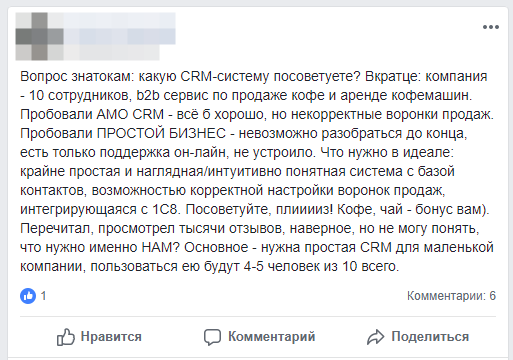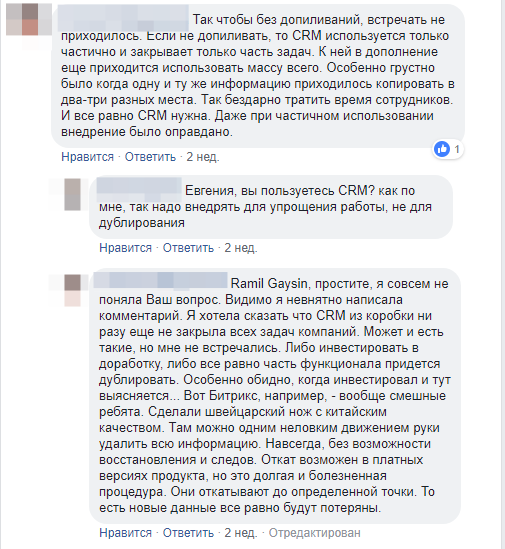Responsible for someone else's bazaar: what social networks say about CRM
We don’t really like social networks, but we have to read them: monitor references, track opinions, get closer to our audience. What is surprising, they talk a lot about CRM, often categorically and quasi expert, less often - reasonably and professionally. But all these people show interest in CRM systems, which means they are interesting to us. We walked on Facebook, collected a bunch of users' statements for 2018 and are ready to answer their claims, opinions, questions in the field of CRM systems. At a minimum, the format turned out to be entertaining, as much as quite useful. After all, the "expertise" just rolls over.

Typical "expert" in a social network
This is the largest block of opinions that can be encountered. We have already become accustomed to the question “What kind of CRM to choose?” On sites where dozens of megabytes of articles are written specifically on this topic. We even got used to strange questions about clouds, missing client databases, Excel, “self-selling CRM”, etc. But for much of what we found, life did not prepare us.
Let's start with the most rabid statements.
')

Everything is perfect here: a dated business organizer (interestingly, does she tear off the corners of the leaves by perforation?), The fifth wheel in a rotten cart (someone definitely loves her job), fine motor skills when manually filling out forms and this is “too easy for her take advantage of others. " We have a reaction like the first commentator: “To go nuts!” How did all these people manage to get together in one thread and so categorically discuss software that they felt they didn't use? But these are all emotions, of course, but in fact we see all the same fears that people who are looking for CRM for business broadcast in different forms.

We in RegionSoft CRM solved this task simply - desktop system, distribution of access rights, several levels of information protection (up to the physical USB-key), logging of all actions. Even if someone manages to unload customers and transaction parameters, the system will fix it and the data will not have time to go far (if the management is, of course, interested in effective interaction with CRM). Well, the truth is that the customer’s funnel needs to be filled, new ones are attracted, because there is no way to leave the existing loyalty strengthened, especially in times of crisis, when they all decide to sit on the money and refuse to buy.
Here is another radical statement:

So, CRM does not interfere, but helps to work with clients "live" - and it does not matter whether you are a realtor, an insurer, an advertiser or a manager of a silicate factory. The company also communicates with clients, as before, only manipulates the maximum of the accumulated data, complements the communication with mailings, takes into account the history of requests, etc. Not to mention the fact that all documents, including commercial proposals, are drawn up not in hours, but in a few clicks.
Further statements are more relaxed, but also very characteristic of the world of CRM-systems. Let us comment on them in turn to dispel possible doubts and myths.

Fully agree. Indeed, some companies sin with the introduction for the sake of implementation in two severe forms:
The rule of choice and implementation of a CRM system: we analyze the processes → compiles requirements → we work with the vendor → we implement. Well, if it is very short.

But did the author of our articles read? :-) Competently described the approach, pleases attention to the processes and understanding of the cost of ownership. Everything would be so!

There is a rational grain about the processes, but about vendors, of course, it is insulting, although we know where the legs of this judgment grow from and even roughly represent who the author of the message faced and with what. Indeed, it is not easy to choose a vendor of a CRM system - there are an incredible amount of them on the market. But, choosing, you need to pay attention to a few points:
Again, it’s 2018 in the yard and it’s not at all necessary to choose a CRM provider from your city — all the work, from presentation to revision and implementation, can be done remotely by the team of the developer you chose.

This discussion requires a separate article. The fact is that “realizing the customer's TZ” may just assume that the customer independently analyzed the business processes and developed the requirements. No less than the questionnaire can be a useless data set, and can be a good basis for further work.
Often, business analysis services are offered not just by vendors, but by consultants who have a vague idea about the engineering and IT part of the implementation. They are introduced to you in the company, work on your side and in the same way offer you a vendor solution. In most cases, your employees will cope with the task better, because they are involved in the processes and know all their advantages and disadvantages (including the mess). Overpay for such a business analysis is definitely not worth it. It is better to competently collect the requirements and zadolbat all colleagues .

If you do not decide to communicate with the vendor, but first you want to collect information on forums, social networks and other sources of information, then it is better to formulate this way: briefly, as informative as possible, with answers to some of the primary questions. By the way, a conversation with a vendor can begin in the same way - no one will be offended at you. However, we do not recommend choosing a CRM system, guided only by the responses of users, since each company has its own unique features, and someone else’s negative experience can confuse you. In addition, the adviser may recommend this or that system to you, not because it was successfully implemented in his company, but because he heard about it only. Oddly enough, vendors on such topics rarely go (we, too).

Also a good description of the requirements would not even include in the post, if not for one BUT. This phrase "and all this is not for cosmic money, of course" usually hides the meaning of "for a penny." A good CRM system is a real software equipment (may an internal engineer forgive me for this blasphemous definition) for your company and it costs accordingly. Again, the “non-cosmic money” criterion is very vague. However, both we and our customers are pleased that today CRM systems are available to absolutely any business and you can choose a solution for any requirements. For example, we even divided our RegionSoft CRM into several editions with a different set of features and different prices - as a result, it is available and relevant both to a small startup, when you just need to take into account customers, set tasks and invoice, and a manufacturing enterprise that requires automation business processes, complete documentation and procurement logistics, inventory management and multi-production, and sales are carried out by the design method.
Another popular question concerns the relationship of the company's employees with the new CRM system. It is so important that we wrote about three articles about it: one , two , three . By the way, the matter concerns not only CRM, but also any other software - even programmers get used to bug trackers with a certain amount of resistance and sometimes even rebellion.

And on such a vital and, in general, competently posed question, a uniquely illiterate and harmful advice comes in:

And one more, testifying to one thing - this post is hardly written by the head of the company. Well, at the same time, another interesting maxim: automation is a myth. But more about that below.

Such methods will lead to dismissals, negative relationships, struggle within the team, etc. To make employees easier to adapt to the new software in the company, it is necessary to pursue a policy of gradual immersion:
Next come the real zen tips:


This, of course, is pure hypocrisy - the introduction of data into a CRM system takes no more (or even less) time than clogging in any file. Information should be stored somewhere, so some time is needed to record it. In addition, some CRMs are able to collect leads and create an entry about a new contact (for example, RegionSoft CRM collects information from a call, mail, web form), and this reduces the time for working with routine operations.
And, finally, the topic of the case:

That's right: the manager should understand that CRM is not designed to “drain all contacts to the boss”, but to work, as a result of which sales and personal income of the sales person and creators of what is being sold (for example, developers) will increase. However, the first proposed option - to put an individual person to fill out customer cards is no good. First, you need to take into account the privacy of each manager's clients (one does not see the base of the other, unless there is a different installation), and second, it is not safe for one person to access the entire client base. But to make CRM a working tool is a great and only true idea.
Golden epigraph for this section:

Great occasion to discuss. When we wrote an article about CRM and MS Excel , social networks reacted strangely and in different directions: someone was for us, someone was fighting for the rights of spreadsheets, someone wrote that the problem as such was long gone and we just came up with the topic . However, among the posts read as part of our experiment, we found other proofs of our correctness - CRM compared Excel, compare it and still know how much it will compare.
But Excel is not alone in its struggle - the users' imagination is limitless, so it has many “associates”.

The second remark perfectly conveys our position regarding the use of alternative tools. Each software is created for specific purposes, and developers "sharpen" and "lick" it is specific, profile features, implement the most frequent user requests in software. It is for this reason that the same Evernote may be the coolest notebook for students and managers, but there can be no CRM. Exactly to the same extent RegionSoft CRM does not pretend to be an ideal bugtracker (although we, for example, use it within the company, including this way - we have all our activities tied to our CRM).
And of course, Excel is not the ancestor of CRM-systems. They were originally created with a different purpose and, if they already went to the roots, then the first CRM prototype was the mechanical vaults of the Rolodex business cards.

In advanced companies, it goes further - for the purposes of customer relationship management, corporate portals, project management systems, bug trackers are used (exotic, but nonetheless, customers are started up instead of the bug and its parameters). Of course, there is no talk of any customer care management — it's just a record of customers and their contacts.
In addition, the use of non-core software as a CRM entails several unpleasant consequences:

Well, quite sad, but quite a common trend:

Indeed, many companies even by ear do not recognize the abbreviation CRM, not to mention the presence of the system in the company. Alas, the lack of automation kills loyalty, service, technical support, in general, gradually negates the efforts of all employees of the company simply because competitors are automated to the teeth and call a little earlier, they learn a little more about the client, bring the deal to completion a little faster. It remains to say one thing:

There are companies that are ready to take on and start developing their CRM. In principle, any company can hire a programmer and plant him to write first data inserts, then simple reports, then histograms. But, first, it will not be CRM ... the first five years, and secondly, it is expensive.


Imagine that you are going to write CRM in PHP, let it be the Yii2 framework, God bless him. It is worth such a Middle (a person who in theory is able to develop at least some kind of software “one person”) 70-100,000 per month. But stop, you need a designer, you need a frontend ... Ok, let's give the design to an outsourcing (it will be expensive), but we will replace the programmer with Yii2 with Fullstack Developer PHP - and this is already 100 - 120,000 minimum. Well, may you be lucky and you have found for 100,000. For the year, you will pay him 1.2 million rubles, for 2 - 2.4 million, etc. And even after you finish working on your CRM system, you cannot get rid of an expensive developer - “exclusive” software will need to be developed and maintained.
For comparison, 50 licenses of the most sophisticated version of RegionSoft CRM Enterprise Plus will cost you 791,250 rubles. (pay once), not to mention the most popular edition of RegionSoft CRM Professional Plus among our customers - 619,250 rubles. And for this money you will immediately receive a developed CRM system, on which an experienced team has worked for 12 years.
And some users of social networks managed to feel all the nuances of this experience.

So, let's summarize why you never write your CRM if you are not a profile development company:
Some companies (especially large industry leaders) believe that they will write a CRM system to fit their needs and will be able to earn more on it. Alas, this is not so: you can create a useful profile application, develop some kind of super-calculator for calculating the transaction or order, and they can be in demand. But CRM from the hands of a competitor hardly anyone wants to buy - at least for security reasons (who knows what mechanisms of transferring valuable commercial information you screwed up there!).
Quite often, a request for a CRM system is formed in this way: “Prompt CRM for ...” Naturally, some vendors cut the chip and decided to make money on it - therefore, you can find dozens of “industry-specific” CRM systems on the websites of some developers, which, in fact, often differ only in the name of fields, reports, etc. All these differences can be configured in the base system, not having even the slightest programming skill.



This industry-specific CRM system is different in that it includes completely rethought logic in accordance with the business processes of the industry. And of course, it is not written in a week or a month. We know what we are talking about - we have an industry system for TV and radio holdings and advertising operators RegionSoft CRM Media. So, it takes into account many features of the work of TRH, including media planning, work with the on-air grid, banners, advertising installations and many others.

This statement deals with core CRM for real estate and CRM as a whole. Of course, the author is completely wrong in the fact that the CRM system should be as lightweight as possible. Any CRM should be functional and cover the maximum of tasks to ensure end-to-end automation. Otherwise, the whole point of working with clients is lost and a simple list of leads and customers is obtained, without any attempts to build loyalty, relationships, etc.

The arguments about the need to individually configure the system are true for each business - indeed, a competent setting allows you to work efficiently right away, rather than postponing the use of an already purchased CRM system for an indefinite period.
But the implementation and training of staff can not take a couple of hours with all the desire - training should be gradual, with the participation of the vendor and without him. With regard to implementation, then look at the diagram or read the article about the basics of the implementation process. Who can do this in a couple of hours?
Some "experienced" advisers are no longer writing comments, but entire learning posts about choosing a CRM system:

And one more fruitful, but not entirely objective discussion:

Of course, there is no industry specificity of the vendor - for example, we implemented RegionSoft CRM in retail , in construction companies, in advertising agencies, in television companies, in manufacturing enterprises, in NGOs, in banks, etc. And exactly as did all the vendors on the market. And the whole thing is precisely in “dopilivaniya” - customization and refinement of the CRM-system for the needs of a particular business (do not believe it, but CRM, configured for one real estate agency, may not be suitable for another). Of course, there are projects without revision, but to treat the “dopilivaniyu” as something very expensive and unnecessary definitely not worth it. In the end, you are cutting long pants, and not tucking them in socks! So why CRM can not neatly "fit" for your company? Can and should be.
Such comments make us puzzled. But on the other hand, it is alarming that users of CRM-systems had so negative experience that they formed such sharp and sometimes inadequate opinions.

"Stupidly felled rubles", of course, can be considered in CRM (for example, in RegionSoft CRM can be considered as sales revenue, and all the cash flows of each project), but most often used for this account programs. And now let's not be cunning: all relations between business and customers ultimately boil down to money. Another thing is that many of the aspects of loyalty lie outside the material plane: for example, the ergonomics of using a gadget, the exhaustive functionality of a CRM system, the comfort and controllability of a car, the taste of chocolate ... But in all these advantages companies invest money and wait for the investment to pay off. All according to the laws of commodity exchange.
Of course, CRM is able to help build any relationship with a client: both material and emotional. For example, you can build a loyalty program, make targeted and targeted mailings, just congratulate you on your professional holidays, etc. In the end, all this helps to form a strong pumped customer base, which sooner or later will bring you income.
So, all the most interesting quotes for the last year have been collected and disassembled, and thoughts about how many more incorrect, strange, almost mythological judgments have settled in personal messages, chats, and in closed groups.
Finally, here are a few common false judgments that may scare you or lead you astray in the process of choosing CRM (we don’t quote them, because many are about competitors):
In general, it is difficult to navigate and find the right selection criteria in the current information cycle. Be vigilant and believe your experience, formulate requirements, do not hesitate to communicate with the vendor.
And this time we'll finish with a quote from one discussion too. Why indeed?

New release of our flagship RegionSoft CRM 7.0

Typical "expert" in a social network
On the choice, implementation and approaches - opinions that shock
This is the largest block of opinions that can be encountered. We have already become accustomed to the question “What kind of CRM to choose?” On sites where dozens of megabytes of articles are written specifically on this topic. We even got used to strange questions about clouds, missing client databases, Excel, “self-selling CRM”, etc. But for much of what we found, life did not prepare us.
Let's start with the most rabid statements.
')

Everything is perfect here: a dated business organizer (interestingly, does she tear off the corners of the leaves by perforation?), The fifth wheel in a rotten cart (someone definitely loves her job), fine motor skills when manually filling out forms and this is “too easy for her take advantage of others. " We have a reaction like the first commentator: “To go nuts!” How did all these people manage to get together in one thread and so categorically discuss software that they felt they didn't use? But these are all emotions, of course, but in fact we see all the same fears that people who are looking for CRM for business broadcast in different forms.
- Comparison with manual filling of various client base storage facilities. This is one of the most common objections when choosing a CRM and the most untenable. Entering data into a CRM system, spreadsheets, text files, etc. in most cases, it happens through the keyboard and differs little from each other - except that CRM swears at an incorrectly filled field. The organization of data storage and processing is different - this is just a feature of specialized software. If your data in Excel is a list with information, then data in CRM is a source of information for sales funnels, business processes, planners, reports, etc. And the data works, and you do not repaint the cells manually, but you work with flags, stages, you get automatic reminders in a minute, at least in a year.
- Distrust of technology. It seems to me that we will deal with this problem for a very, very long time - this is enough for our age. It is in our IT and engineering world that each, if not a hacker, then a programmer, engineer, or tester, in an extreme case, an evil and attentive user millenial. And in the business world, the mass of workers of all ages turn to the computer for “you”, they are not at all friendly with him, and they consider knowledge of 1C to be the top of procarminess. These can be excellent managers, logisticians, salespeople, marketers, accountants, foremen, secretaries, etc., but with a PC, the business is a pipe. And they do not believe in technology - a paper notepad on the table seems to them unlike more reliably.
- Security concerns. Of course, there is no absolutely safe software - everything can be hacked, there would be a desire. However, by virtue of clause 2, protection against lamer is more important and against the possibility of merging, copying the base, transferring access to the cloud, etc.

We in RegionSoft CRM solved this task simply - desktop system, distribution of access rights, several levels of information protection (up to the physical USB-key), logging of all actions. Even if someone manages to unload customers and transaction parameters, the system will fix it and the data will not have time to go far (if the management is, of course, interested in effective interaction with CRM). Well, the truth is that the customer’s funnel needs to be filled, new ones are attracted, because there is no way to leave the existing loyalty strengthened, especially in times of crisis, when they all decide to sit on the money and refuse to buy.
Here is another radical statement:

So, CRM does not interfere, but helps to work with clients "live" - and it does not matter whether you are a realtor, an insurer, an advertiser or a manager of a silicate factory. The company also communicates with clients, as before, only manipulates the maximum of the accumulated data, complements the communication with mailings, takes into account the history of requests, etc. Not to mention the fact that all documents, including commercial proposals, are drawn up not in hours, but in a few clicks.
Further statements are more relaxed, but also very characteristic of the world of CRM-systems. Let us comment on them in turn to dispel possible doubts and myths.

Fully agree. Indeed, some companies sin with the introduction for the sake of implementation in two severe forms:
- Large companies choose CRM systems not according to the requirements, but according to the principle “like all big ones” and buy SAP, Salesforce, custom solutions from large vendors. They buy it, because it’s far from always coming up with full implementation, there’s not enough money for it, the company doesn’t understand why it is this CRM and how to navigate through this interface.
- Small companies choose promoted solutions, which usually offer free versions or incredible simplicity. These are, of course, marketing pitfalls: free CRM systems are associated with a mass of restrictions and are designed to stimulate the transition to the paid version, and one has to pay for simplicity with an incredible complication due to numerous integrations with third-party applications.
The rule of choice and implementation of a CRM system: we analyze the processes → compiles requirements → we work with the vendor → we implement. Well, if it is very short.

But did the author of our articles read? :-) Competently described the approach, pleases attention to the processes and understanding of the cost of ownership. Everything would be so!

There is a rational grain about the processes, but about vendors, of course, it is insulting, although we know where the legs of this judgment grow from and even roughly represent who the author of the message faced and with what. Indeed, it is not easy to choose a vendor of a CRM system - there are an incredible amount of them on the market. But, choosing, you need to pay attention to a few points:
- the vendor’s time on the market — if it’s 1-2 years, then they’d rather simply resell someone else’s software or create a simple program and call it CRM;
- the presence of any feedback on the work of the company;
- release and / or revision number;
- vendor tariff plans.
Again, it’s 2018 in the yard and it’s not at all necessary to choose a CRM provider from your city — all the work, from presentation to revision and implementation, can be done remotely by the team of the developer you chose.

This discussion requires a separate article. The fact is that “realizing the customer's TZ” may just assume that the customer independently analyzed the business processes and developed the requirements. No less than the questionnaire can be a useless data set, and can be a good basis for further work.
Often, business analysis services are offered not just by vendors, but by consultants who have a vague idea about the engineering and IT part of the implementation. They are introduced to you in the company, work on your side and in the same way offer you a vendor solution. In most cases, your employees will cope with the task better, because they are involved in the processes and know all their advantages and disadvantages (including the mess). Overpay for such a business analysis is definitely not worth it. It is better to competently collect the requirements and zadolbat all colleagues .

If you do not decide to communicate with the vendor, but first you want to collect information on forums, social networks and other sources of information, then it is better to formulate this way: briefly, as informative as possible, with answers to some of the primary questions. By the way, a conversation with a vendor can begin in the same way - no one will be offended at you. However, we do not recommend choosing a CRM system, guided only by the responses of users, since each company has its own unique features, and someone else’s negative experience can confuse you. In addition, the adviser may recommend this or that system to you, not because it was successfully implemented in his company, but because he heard about it only. Oddly enough, vendors on such topics rarely go (we, too).

Also a good description of the requirements would not even include in the post, if not for one BUT. This phrase "and all this is not for cosmic money, of course" usually hides the meaning of "for a penny." A good CRM system is a real software equipment (may an internal engineer forgive me for this blasphemous definition) for your company and it costs accordingly. Again, the “non-cosmic money” criterion is very vague. However, both we and our customers are pleased that today CRM systems are available to absolutely any business and you can choose a solution for any requirements. For example, we even divided our RegionSoft CRM into several editions with a different set of features and different prices - as a result, it is available and relevant both to a small startup, when you just need to take into account customers, set tasks and invoice, and a manufacturing enterprise that requires automation business processes, complete documentation and procurement logistics, inventory management and multi-production, and sales are carried out by the design method.
Employees riot against CRM
Another popular question concerns the relationship of the company's employees with the new CRM system. It is so important that we wrote about three articles about it: one , two , three . By the way, the matter concerns not only CRM, but also any other software - even programmers get used to bug trackers with a certain amount of resistance and sometimes even rebellion.

And on such a vital and, in general, competently posed question, a uniquely illiterate and harmful advice comes in:

And one more, testifying to one thing - this post is hardly written by the head of the company. Well, at the same time, another interesting maxim: automation is a myth. But more about that below.

Such methods will lead to dismissals, negative relationships, struggle within the team, etc. To make employees easier to adapt to the new software in the company, it is necessary to pursue a policy of gradual immersion:
- to train
- form an internal expert
- use documentation
- switch to CRM gradually
- to motivate, but not to loop motivation on routine procedures
Next come the real zen tips:


This, of course, is pure hypocrisy - the introduction of data into a CRM system takes no more (or even less) time than clogging in any file. Information should be stored somewhere, so some time is needed to record it. In addition, some CRMs are able to collect leads and create an entry about a new contact (for example, RegionSoft CRM collects information from a call, mail, web form), and this reduces the time for working with routine operations.
And, finally, the topic of the case:

That's right: the manager should understand that CRM is not designed to “drain all contacts to the boss”, but to work, as a result of which sales and personal income of the sales person and creators of what is being sold (for example, developers) will increase. However, the first proposed option - to put an individual person to fill out customer cards is no good. First, you need to take into account the privacy of each manager's clients (one does not see the base of the other, unless there is a different installation), and second, it is not safe for one person to access the entire client base. But to make CRM a working tool is a great and only true idea.
Competitive Tools
Golden epigraph for this section:

Great occasion to discuss. When we wrote an article about CRM and MS Excel , social networks reacted strangely and in different directions: someone was for us, someone was fighting for the rights of spreadsheets, someone wrote that the problem as such was long gone and we just came up with the topic . However, among the posts read as part of our experiment, we found other proofs of our correctness - CRM compared Excel, compare it and still know how much it will compare.
But Excel is not alone in its struggle - the users' imagination is limitless, so it has many “associates”.

The second remark perfectly conveys our position regarding the use of alternative tools. Each software is created for specific purposes, and developers "sharpen" and "lick" it is specific, profile features, implement the most frequent user requests in software. It is for this reason that the same Evernote may be the coolest notebook for students and managers, but there can be no CRM. Exactly to the same extent RegionSoft CRM does not pretend to be an ideal bugtracker (although we, for example, use it within the company, including this way - we have all our activities tied to our CRM).
And of course, Excel is not the ancestor of CRM-systems. They were originally created with a different purpose and, if they already went to the roots, then the first CRM prototype was the mechanical vaults of the Rolodex business cards.

In advanced companies, it goes further - for the purposes of customer relationship management, corporate portals, project management systems, bug trackers are used (exotic, but nonetheless, customers are started up instead of the bug and its parameters). Of course, there is no talk of any customer care management — it's just a record of customers and their contacts.
In addition, the use of non-core software as a CRM entails several unpleasant consequences:
- users do not get used to specific terminology and in case of transition to a real CRM (and it will happen sooner or later) are not ready to accept the new interface
- all customer relationship management chips are lost: sales funnel, work with calls, primary documentation, reporting, and so on.
- software security is significantly reduced due to a number of reasons: for example, lack of distribution of access rights or the possibility of working with files, etc.

Well, quite sad, but quite a common trend:

Indeed, many companies even by ear do not recognize the abbreviation CRM, not to mention the presence of the system in the company. Alas, the lack of automation kills loyalty, service, technical support, in general, gradually negates the efforts of all employees of the company simply because competitors are automated to the teeth and call a little earlier, they learn a little more about the client, bring the deal to completion a little faster. It remains to say one thing:

About CRM, written "on the knee"
There are companies that are ready to take on and start developing their CRM. In principle, any company can hire a programmer and plant him to write first data inserts, then simple reports, then histograms. But, first, it will not be CRM ... the first five years, and secondly, it is expensive.


Imagine that you are going to write CRM in PHP, let it be the Yii2 framework, God bless him. It is worth such a Middle (a person who in theory is able to develop at least some kind of software “one person”) 70-100,000 per month. But stop, you need a designer, you need a frontend ... Ok, let's give the design to an outsourcing (it will be expensive), but we will replace the programmer with Yii2 with Fullstack Developer PHP - and this is already 100 - 120,000 minimum. Well, may you be lucky and you have found for 100,000. For the year, you will pay him 1.2 million rubles, for 2 - 2.4 million, etc. And even after you finish working on your CRM system, you cannot get rid of an expensive developer - “exclusive” software will need to be developed and maintained.
For comparison, 50 licenses of the most sophisticated version of RegionSoft CRM Enterprise Plus will cost you 791,250 rubles. (pay once), not to mention the most popular edition of RegionSoft CRM Professional Plus among our customers - 619,250 rubles. And for this money you will immediately receive a developed CRM system, on which an experienced team has worked for 12 years.
And some users of social networks managed to feel all the nuances of this experience.

So, let's summarize why you never write your CRM if you are not a profile development company:
- it is expensive - the resources spent are not worth the effect
- you will have to face unscrupulous contractors (freelancers, companies, etc.), on which the development process will depend
- you will lag behind vendor releases for ages, and your competitors will use the most new and useful features.
Some companies (especially large industry leaders) believe that they will write a CRM system to fit their needs and will be able to earn more on it. Alas, this is not so: you can create a useful profile application, develop some kind of super-calculator for calculating the transaction or order, and they can be in demand. But CRM from the hands of a competitor hardly anyone wants to buy - at least for security reasons (who knows what mechanisms of transferring valuable commercial information you screwed up there!).
Speaking of industry CRM
Quite often, a request for a CRM system is formed in this way: “Prompt CRM for ...” Naturally, some vendors cut the chip and decided to make money on it - therefore, you can find dozens of “industry-specific” CRM systems on the websites of some developers, which, in fact, often differ only in the name of fields, reports, etc. All these differences can be configured in the base system, not having even the slightest programming skill.



This industry-specific CRM system is different in that it includes completely rethought logic in accordance with the business processes of the industry. And of course, it is not written in a week or a month. We know what we are talking about - we have an industry system for TV and radio holdings and advertising operators RegionSoft CRM Media. So, it takes into account many features of the work of TRH, including media planning, work with the on-air grid, banners, advertising installations and many others.

This statement deals with core CRM for real estate and CRM as a whole. Of course, the author is completely wrong in the fact that the CRM system should be as lightweight as possible. Any CRM should be functional and cover the maximum of tasks to ensure end-to-end automation. Otherwise, the whole point of working with clients is lost and a simple list of leads and customers is obtained, without any attempts to build loyalty, relationships, etc.

The arguments about the need to individually configure the system are true for each business - indeed, a competent setting allows you to work efficiently right away, rather than postponing the use of an already purchased CRM system for an indefinite period.
But the implementation and training of staff can not take a couple of hours with all the desire - training should be gradual, with the participation of the vendor and without him. With regard to implementation, then look at the diagram or read the article about the basics of the implementation process. Who can do this in a couple of hours?
Some "experienced" advisers are no longer writing comments, but entire learning posts about choosing a CRM system:

And one more fruitful, but not entirely objective discussion:

Of course, there is no industry specificity of the vendor - for example, we implemented RegionSoft CRM in retail , in construction companies, in advertising agencies, in television companies, in manufacturing enterprises, in NGOs, in banks, etc. And exactly as did all the vendors on the market. And the whole thing is precisely in “dopilivaniya” - customization and refinement of the CRM-system for the needs of a particular business (do not believe it, but CRM, configured for one real estate agency, may not be suitable for another). Of course, there are projects without revision, but to treat the “dopilivaniyu” as something very expensive and unnecessary definitely not worth it. In the end, you are cutting long pants, and not tucking them in socks! So why CRM can not neatly "fit" for your company? Can and should be.
The strangest
Such comments make us puzzled. But on the other hand, it is alarming that users of CRM-systems had so negative experience that they formed such sharp and sometimes inadequate opinions.

"Stupidly felled rubles", of course, can be considered in CRM (for example, in RegionSoft CRM can be considered as sales revenue, and all the cash flows of each project), but most often used for this account programs. And now let's not be cunning: all relations between business and customers ultimately boil down to money. Another thing is that many of the aspects of loyalty lie outside the material plane: for example, the ergonomics of using a gadget, the exhaustive functionality of a CRM system, the comfort and controllability of a car, the taste of chocolate ... But in all these advantages companies invest money and wait for the investment to pay off. All according to the laws of commodity exchange.
Of course, CRM is able to help build any relationship with a client: both material and emotional. For example, you can build a loyalty program, make targeted and targeted mailings, just congratulate you on your professional holidays, etc. In the end, all this helps to form a strong pumped customer base, which sooner or later will bring you income.
So, all the most interesting quotes for the last year have been collected and disassembled, and thoughts about how many more incorrect, strange, almost mythological judgments have settled in personal messages, chats, and in closed groups.
And a couple of "tricks" in the results
Finally, here are a few common false judgments that may scare you or lead you astray in the process of choosing CRM (we don’t quote them, because many are about competitors):
- “After the introduction of CRM, sales growth is increased by 20%” - there is no exact data on this account, the growth is individual for each company, as well as the payback period for investments in CRM. CRM itself will not be able to achieve results, a lot depends on the industry, approaches, qualifications and experience of employees. But that the routine is facilitated and the speed of sale increases - a fact.
- “Complete the deployment within 3 days” - no deployment can be completed within this time limit.
- "CRM with maximum integration" - most likely, you will have to re-buy numerous third-party applications and pay monthly for their use in conjunction with CRM (most often via API).
- "Integration with 1C out of the box" - maximum data exchange. Integration of CRM with 1C is a very problematic procedure, which has a number of features for each company, so some kind of basic integration will not work.
- "Do not buy box solutions, take the cloud." The box is an outdated and illiterate concept today. There are practically no box products now: there are desktop (server, on-premise) solutions and cloud solutions. By the way, yes, cloudy ≠ SaaS. SaaS is a model in which a CRM is rented (for example, RegionSoft CRM can also be rented , while it is desktop).
In general, it is difficult to navigate and find the right selection criteria in the current information cycle. Be vigilant and believe your experience, formulate requirements, do not hesitate to communicate with the vendor.
And this time we'll finish with a quote from one discussion too. Why indeed?

New release of our flagship RegionSoft CRM 7.0
Source: https://habr.com/ru/post/426689/
All Articles